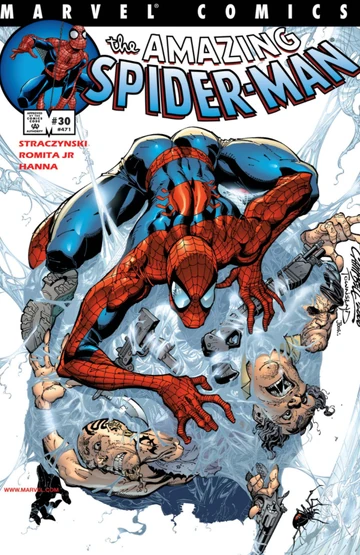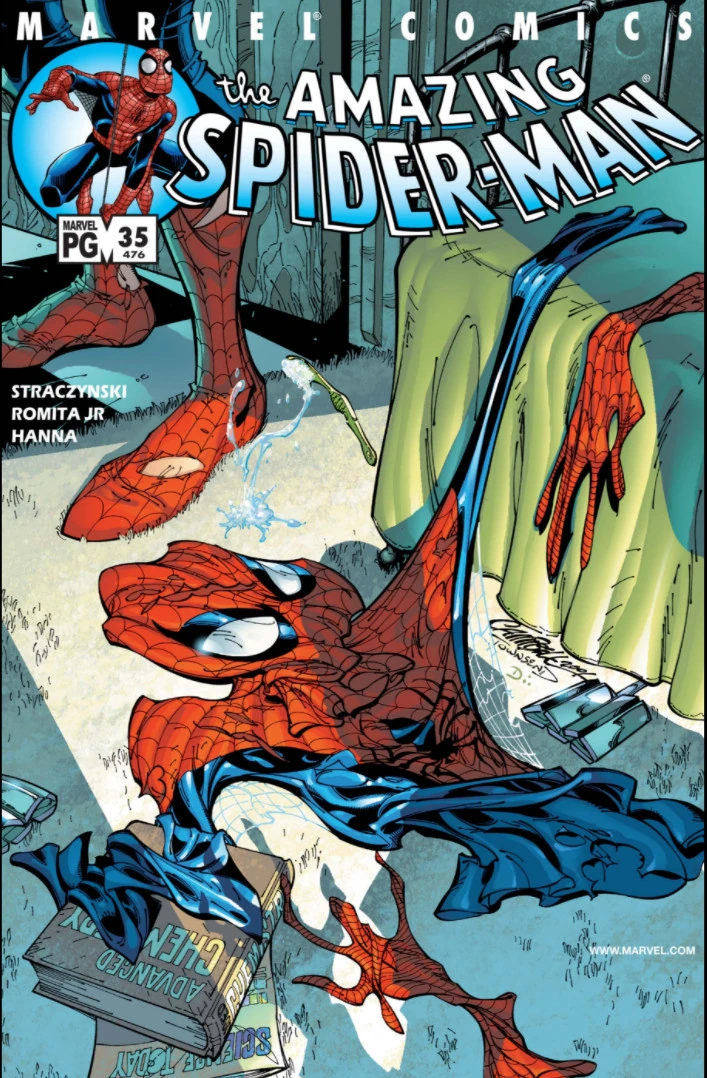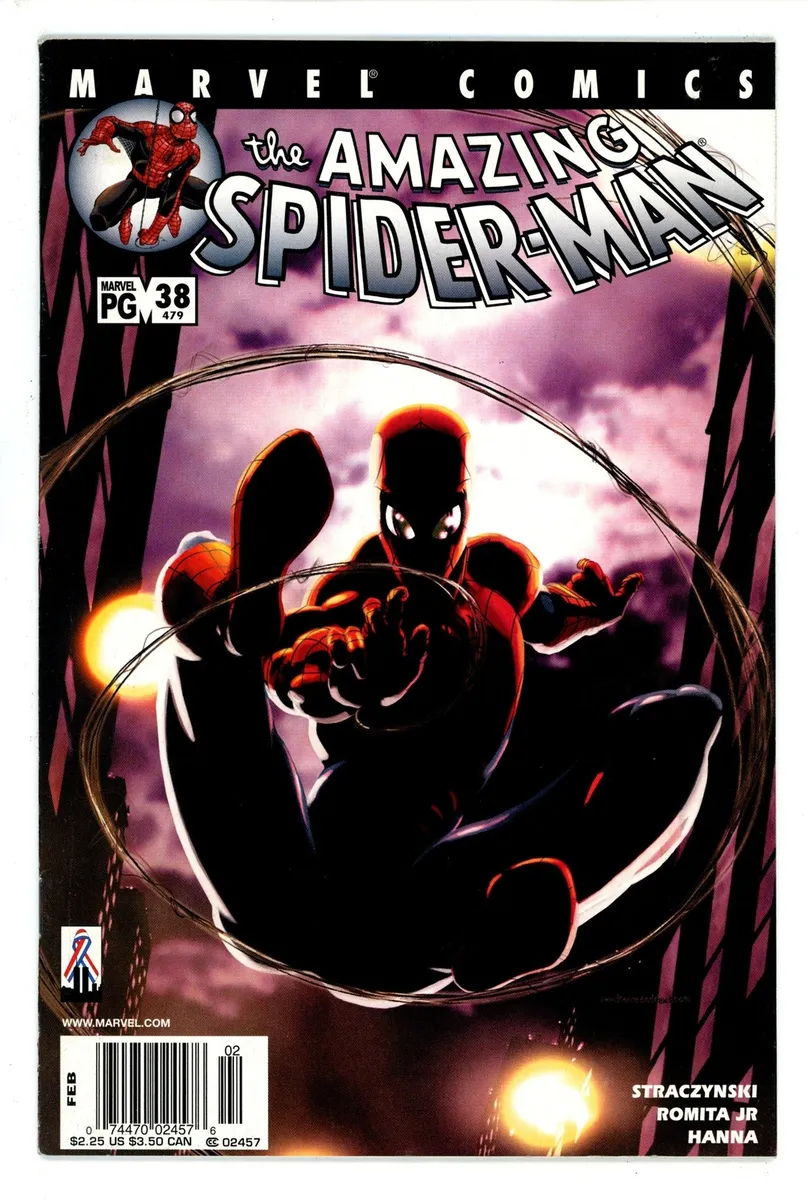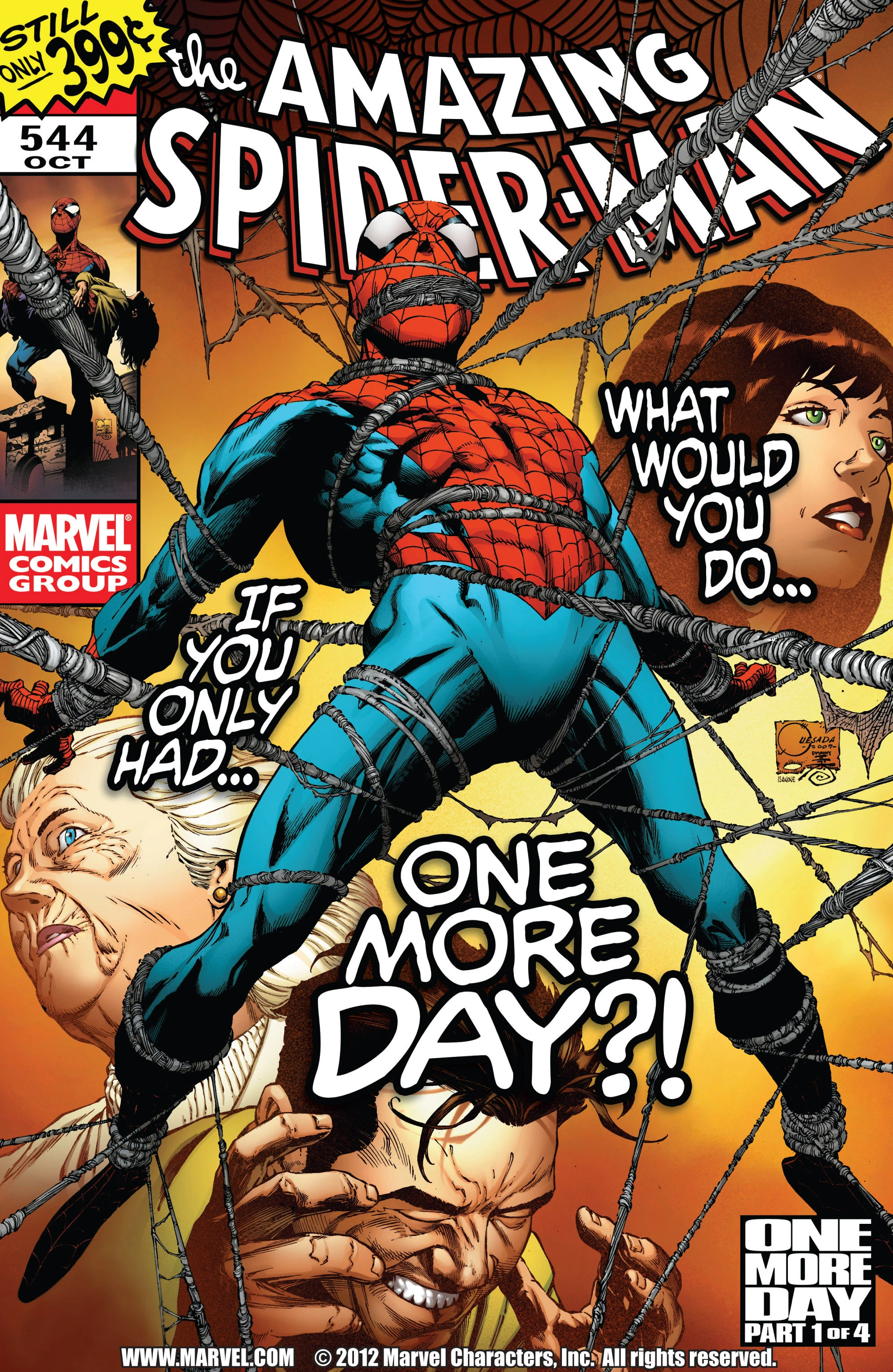Spider-Man 2000s
- Matthew Werenich

- Dec 27, 2023
- 8 min read
I think this is where I’m gonna say goodbye to Spider-Man.
Top Ten 00s Spider-Man Issues
Morlun & Ezekiel: The Amazing Spider-Man Vol. 2 30, 2001
The 9/11 Issue: TASM Vol. 2 36, 2001
Aunt May Finds Out: TASM Vol. 2 35, 2001
The Conversation: TASM Vol. 2 38, 2001
Road to Civil War: TASM 529-531, 2006
Revealing His Identity: TASM 533, 2006
Aunt May Shot: TASM 538, 2007
Back In Black: TASM 539-543, 2007
One More Day, Part 1: TASM 544, 2007
One More Day, Part 2: TASM 545, 2007
This decade had some of the most compelling Spider-Man storytelling I’ve seen yet. There was a major tonal shift this decade, both in terms of the art design and in the narrative style. The editors barging in with little quips here and there is almost gone, along with the self-narration that was heavily used in the 90s. Everything feels more cinematic in these issues, which isn’t necessarily a bad or a good thing – just different. And different is refreshing after forty years.
First, I loved reading the issues written by J. Michael Straczynski. I knew he was the one who was forced to write “One More Day” which I’ve read many years ago, but he’s also the guy who wrote the television show Babylon 5 that I really really loved. He’s a great storyteller, with a real sense of consequences, casaulity, and tying up loose ends. Those are all such important facets of narrative. To that end, the year he started writing was the year that Aunt May learned Peter’s secret identity as Spider-Man – and the issue where they talk about it for the very first time was just thrilling.
That said, the highlight of the decade is Civil War, a major ongoing event that ran for about a year. It eventually inspired the MCU film “Captain America: Civil War” in 2016. There’s a hefty amount of suspending disbelief involved in superhero stories, which is why it’s always exciting when storylines challenge this essential premise. In the Lego Batman movie, for example, Barbara Gordon rightly points out that for all Batman’s crimefighting, Gotham City is still riddled with crime and a plethora of dangerous supervillains. In the same way, Civil War kicks things off by addressing the elephant in the room – you can’t just let anyone with a mask do whatever they want in the name of fighting crime. As superheroes who have spent their entire history doing more or less that exact thing, the characters we know and love quickly take sides on the debate. What’s great about this is that both sides had good points. Iron Man’s desire to keep heroes accountable is completely sensible, while Captain America’s refusal to take a stand against people trying to do the right thing is also commendable. The fun is in watching the heroes we know and love do battle, and there’s no shortage of that in this series.
In more than one way, this comic is superior to the film that came afterwards. For one thing, there’s a million and one heroes involved in this storyline, whereas the film gave us closer to a dozen – if that. Further, this series gave significant repercussions to the Marvel world – from Spider-Man’s revealed identity to Captain America’s assassination, to Stark’s new job as the director of S.H.I.E.L.D.. It was an event that impacted nearly every Marvel comic running at the time, but few were as significant as Spidey. Not only did we get a number of compelling conversations as Spider-Man struggled with the moral dilemma of being a superhero employee of the government, but we had a major development – Spider-Man revealed his secret identity to the world.
Wow! This is what I’m talking about! These are the big moments that stories are made for – it’s a moment of real change that forces the character to redefine himself, and it opens the door to a whole new world of stories. How will average ordinary Peter Parker react to a life of notoriety and fame? Sure, MJ’s grappled with the press before, but that kind of attention has never been Pete’s thing. How will his relationship with J Jonah Jameson develop? There’s a million different ways you could have taken the story…which leads us to Back In Black.
Aunt May gets shot as a result of Pete’s reveal to the public, so Back In Black gives us a side of Spider-Man that we rarely see – a cold, unforgiving protagonist who has no patience for small talk with his enemies. It’s really thrilling seeing the hero we know and love at the end of his rope, and the series grows in intensity as he gets closer and closer to his target. The showdown between Spider-Man and Kingpin is gripping, both because of Kingpin’s audacity in the face of Peter’s grief but also because of Peter’s complete character shift. He even goes as far as to separate his dual identities so as to preserve the moral compass of one while compromising the other. It’s fun on paper, even if a defense of that nature would never hold up in court.
The one thing that surprised me about this arc was how complacent Mary Jane was in Peter’s path. Personally, I found it odd that Mary Jane was cool to stick with Aunt May and encourage Peter to go beat people up. I mean, if I had been in MJ’s place, I would likely have encouraged Peter to stick around for a few reasons. One, May could die at any moment. He should be there for that. Two, it’s his aunt, not mine. I mean, I get why MJ loves Aunt May – who doesn’t, after all – but the fact that May is wasting away while Peter goes around knocking heads together doesn’t seem to be putting May first. Thirdly, what good could possibly come of Peter running around enraged? If ever he’s been emotionally unfit for duty, it’d be now. Would you tell a policeman who’d just lost a family member to gun violence to head to work the next day? It just felt like MJ should’ve been less okay with Peter’s plan than she was.
Even so, this was a fun read. It’s a great follow-up to Civil War, and the predecessor to one of the most notorious Spider-Man comics ever…One More Day.
When things kick off, Aunt May is dying from a gunshot wound meant for Peter Parker. Peter has tried everything to save her life, but the fact is she’s wicked old and hanging on by a thread. Peter’s been told many times that she’s going to die, but he just can’t accept it. The only thing that could save her now is a miracle…or something much worse. This guy Mephisto comes along, who’s more or less a carbon copy of Satan. He offers to save Aunt May’s life, but in exchange, he wants to undo Peter and Mary Jane’s marriage.
Now, let’s just stop there for a second and look at this objectively. Aunt May is old. Really old. She’s a wonderful character, and an iconic piece of the Spider-Man universe. Losing her would be devastating…but it’s not as if she’s got many years left to live anyway. People die. It’s inevitable. And keep in mind that loyal readers have already watched her die at least twice (there may be more in issues that I didn’t read). Heck, even in the early sixties, it seemed like Aunt May was going to drop dead at any given moment. She was constantly sick, in the hospital, or one jump-scare away from a heart attack. The story is begging to be told – a story of Peter losing her for good and having to move on.
Now, Peter and MJ’s marriage on the other hand is a different matter. They’re both young-ish. They’ve got their whole lives ahead of them. More than that, marriage is a thing of self-sacrifice. When you marry someone, you put their needs ahead of yours, and they do the same for you. You prioritize each other over everything else. So to consider this offer from Mephisto is basically to ask the question: Do you love your mom or your wife more?
Yes, Aunt May isn’t his mom, but she plays the same role. And to be clear, I love my mom. And I love my wife. But I love them in very different and very obvious ways. And one of the things of being married means that I cling to my wife above anyone else. Moms come second to wives. My mom wouldn’t have it any other way, to be honest. That doesn’t mean you kick your mom to the curb when you get married. But it does mean she’s no longer the most important woman in your life. She can’t be. And that’s good and normal and healthy.
Now, for MJ to consider this offer is one thing. After all, being self-sacrificing means looking out for the needs of your partner. But then again, if I were MJ, I wouldn’t be giving this much thought. Aunt May is gonna die in a little while anyway. Who will be able to provide Peter support for longer? MJ!
And beyond that, if I were MJ and Peter was considering cancelling my marriage, I would be heartbroken beyond belief – and more than a little angry. Did you do vows with your mother? Did you have a ceremony in front of everyone saying you’d give your life for her? Who are you living with right now? Heck – MJ was the one standing by Aunt May’s side in the hospital while Peter was out taking his shirt off to beat up Kingpin. If anyone cares about Aunt May, it’s MJ.
In this comic, Peter says that the thing that makes this decision so difficult is that it’s his fault Aunt May got shot. And hey, he’s kind of right. But at the same time, the wickedness of someone else is never our own. But to give up your own marriage in order to ease your own conscience is an incredibly selfish thing to do. No wonder everyone lost their minds at Peter’s decision.
Now, for all my bickering and whining, here’s what I loved about this comic. There were real emotional stakes. Either Aunt May was gonna die, which would’ve been huge, or Spidey’s marriage was gonna disappear. Neither option was great, and that’s awesome from a storytelling standpoint. More than that, the comic seemed to agree with the fans in the sense that everyone in the comic told Peter this was a bad idea. Everyone was telling him that it was time to let Aunt May go, which means that the writers understand the gravity of their decision. But last of all, as much as I writhe and squirm over the decision, I can’t deny the emotion I felt watching Peter and MJ spend their last few hours together. It was heartbreaking, honest, and incredibly solemn for a comic about a spandex-wearing crimefighter. Love it or hate it (and it’s likely the latter), they did one heck of a job ruining Peter’s life.
This comic would eventually go on to inspire elements of Spider-Man: No Way Home – though in that film, Peter loses not only his relationship with MJ but his Aunt too. So I guess this comic version of Spider-Man actually got off easy.
For all that, I did say at the start of this that I think this is where I’m gonna stop. And here’s why.
When Mephisto does his magic and erases MJ and Pete’s marriage, he doesn’t just undo their marriage. Everyone forgets Pete is Spider-Man – even Aunt May. Characters who have been dead for a long time are inexplicably back to life. It’s effectively a reboot of the entire series. And when we time travel to change the future, we also erase the past. The Spider-Man who got married never existed now – but it’s his story that I was desperate to hear the most because he was the one character who against all odds kept finding new ways to grow. Once again, someone behind the scenes undid the growth in order to keep Spider-Man rooted in his very first steps.
I’ve read nearly two hundred Spider-Man issues – still barely a drop in the bucket compared to how many are out there. But it’s enough to know that this cycle of growth and un-growth is somehow unavoidable in this genre. Are there more great Spider-Man stories after One More Day? I’m sure there are – the Spider-Verse saga comes to mind among other things. But I’ve put a year into this, and I think this is as good a place as any to stop – because this is where, in a very real sense, Spider-Man died.
I had a blast reading these, and I’m glad I did. It was so cool seeing the character change over the years, and I can’t wait to see what they do with him next. But I think now I’d like to get back to reading actual novels and finding stories that know how to end well.



















Comments